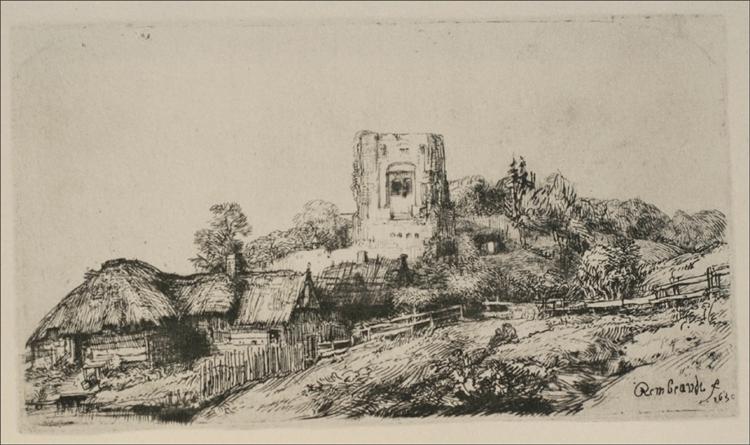Kuvaus
Rembrandt's 1650 painting "A Village with a Square Tower" presents a fascinating study of rural life and the interaction of man with his architectural surroundings. In this painting, the Dutch master displays his unmistakable skill in the representation of light and shadow, a central element in his practice that defines his style and distinguishes him in the history of art.
The composition of the work is based on the prominent figure of the square tower, which serves as a central axis that captures the viewer's attention. This structure, with a sober and robust design, contrasts significantly with the delicacy of the landscape that surrounds it. Rembrandt manages to make the tower not only an architectural element, but also a symbol of the community, of stability and of the daily life that takes place in its vicinity. The location of the tower within the painting establishes a visual hierarchy that invites the eye to explore the landscape, where smaller buildings and trees are distributed in a balance that highlights the harmony between man and nature.
The use of color in “A Village with a Square Tower” is subtle and timeless. Soft, earthy tones predominate, evoking an atmosphere of tranquility. Browns, ochres and greens are mixed with touches of light, which Rembrandt masterfully distributes across different areas of the piece. This use of color not only contributes to the feeling of realism in the painting, but also establishes a melancholic and contemplative atmosphere, characteristic of the artist’s work.
Unlike other landscape paintings of his time, which often take a more idealised or romantic approach, in this work Rembrandt seems to focus on the essence of everyday life. The village, though serene in its presentation, is a representation of reality – a visual testimony to the inhabitants who fill it with life, even if they are not explicitly represented. This focus on the absence of palpable human figures for the viewer makes the work inviting for contemplation: one can almost hear the murmur of daily life taking place behind the walls of the buildings, while the observer is called to imagine the stories of the characters who inhabit that space.
Rembrandt, best known for his portraits and biblical scenes, extends his mastery to the depiction of landscape in works such as this one, which reflect his ability to capture light and emotion through the environment. The work is a clear example of his ability to transcend the conventions of his time, blending landscape with narrative, suggesting the presence of a community without needing to show it directly.
"A Village with a Square Tower" resonates deeply within the context of Rembrandt's work, not only as a technical exercise, but also as a manifestation of his philosophy on art. In this painting, the painter does not seek to tell an explicit story, but rather to capture an ephemeral moment in time, an instant in which nature, construction and human life coexist in a sublime balance. The work thus becomes a silent witness to life in the 17th century, inviting the viewer to discover beauty in the simplicity of everyday life.
KUADROS ©, a famous painting on your wall.
Hand-made oil painting reproductions, with the quality of professional artists and the distinctive seal of KUADROS ©.
Painting reproduction service with satisfaction guarantee. If you are not completely satisfied with the replica of your painting, we will refund 100% of your money.

